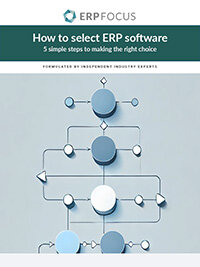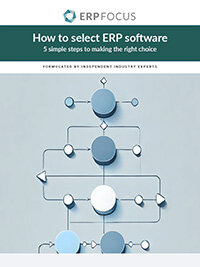Key selection criteria for a job shop ERP
If you’ve been using conventional job shop software for your business, you’ve probably noticed its limitations. It might be ok for basic input and outputs but is lacking in deeper visibility and business intelligence.
While you might feel your operation is too small to use an ERP, ask yourself these questions…
Are you:
- Spending time entering the same data into different systems?
- Struggling to work out profit from a certain batch production?
- Using different accounting packages for different areas of your manufacturing business?
- Or perhaps you have separate accounting software and job shop software?
- Lacking supply chain visibility?
If so, then the easy answer to these issues is to use a job shop ERP system.
What are job shop ERP systems?
Job shop ERPs provide similar benefits to small-scale manufacturing as they do for larger enterprises. To make these modules more relevant to smaller businesses, a job shop ERP focuses on the following:
- Scheduling
- Job tracking
- Inventory tracking
- Document management
What to look for in a job shop ERP solution
The ERP marketplace has several big-name players. The question is which one is right for your manufacturing business. Given you are looking for a value for money solution, it is good practice to ensure your ERP handles the following:
Scheduling
ERP adds a new dimension in that it allows you to schedule jobs and change scheduled jobs as needed. This adds flexibility to your workflow allowing you to minimize downtime. Late supply of key materials, for example, results in unneeded headaches as production comes to a halt.
With your scheduling module guiding you it becomes possible to reassign your teams to work on different workflow aspects. This keeps the wheels turning while you resolve the issue that has caused the delay. Good use of workflow scheduling ensures your teams are as productive as they can be.
The scheduling ERP module allows you to plan workflow more effectively. You can factor in inventory deliveries, processing times, and compare this to deadlines. This extra visibility ensures better running of the operation. In turn, this leads to forging a better reputation for the business helping you to expand.
As a general rule, ensure your choice of ERP has a comprehensive scheduling module.
Job tracking
A good ERP system will give you full visibility on job tracking. This not only lets you see what is going on with each batch, but you can make key decisions to address bottlenecks and other issues that affect workflow.
The scope here to operate a better manufacturing organization is far-reaching. Consider:
- You can provide better customer service. If there is an issue with delivery or deadlines you can inform your customer straight away. You also have the knowledge to provide revised delivery times and control possible reputation damage.
- Job tracking isn't only about tracking workflow. Once a batch is with the customer, invoicing happens within the same system. This allows better traceability and transparency as well as better business intelligence. It is far easier to chase late payments using good job shop ERP systems than switching between applications.
- Job tracking also provides a morale boost. It is always good to see the finished products on the delivery van on their way to your customers.
Inventory tracking
Inventory tracking is one of the reasons ERP systems development occurred. Before they became common, manufacturing firms spent a small fortune on maintaining stocks.
Inventory management modules negate the need to hold large stocks. These modules using the material resource procurement module allows you to track your inventory usage. They allow you to automate the reorder process. Providing you keep the data current you should never run out of mission-critical parts or materials.
As well as this, inventory tracking allows you to do the following:
- Track and input price fluctuations of materials and parts. This allows you to adjust customer pricing in line with your bottom line figure.
- You can run reports showing late inventory deliveries.
- You can feed customer orders into the system so it can account for how much stock you'll need to fulfil them. It then raises vendor orders to meet demand.
Document management
The document management capability of ERPs adds significant value to an operation. Having easily accessible documents allows for a significant reduction in training costs. It is good practice to store vital information needed for smoother manufacturing workflow within the ERP system.
Once you do this you can realize the following benefits:
- Reduced HR costs - With training documentation on hand, on the spot and ad-hoc training becomes possible. No more costly training courses and losing valuable time. Training is now on demand using documents stored in the system.
- Specific documentation referring to workflow and material configuration is now sharable. Anybody that needs to see the documentation can refer to it at any time. Chosen third parties such as vendors can now see the documentation if needed.
- Non-manufacturing documentation is also held in the system; such as health and safety procedures and other relevant HR documents.
Document management is key to a good ERP system. Scrabbling around for information is a huge time-suck.
Scalability
You might feel you’re small now but as you keep delivering on your promises your business will expand. You need a job shop ERP system can grow with you. If it does, you’ll save on implementation and training costs. It’ll also save money as it minimizes disruption.
Expanding a business is stressful. If your system is robust to expand with your business that’s one headache removed.
Choosing the right ERP is not an easy task. Evaluate your business needs, talk to vendors and match their offering with your business requirements.
Free white paper

How to Select ERP
Learn to select your ERP in 5 easy steps by following our expert's advice

Featured white papers
-

ERP Software Pricing Guide
Get the latest pricing information on over 80 popular ERP systems, and learn how to budget for your ERP project in our free guide
Download -

60-Step ERP Selection Checklist
Get the comprehensive checklist for your ERP selection project
Download -

ERP Demo Guide & Scorecard
Master your ERP demo with 5 easy steps using our free guide (includes demo scorecard)
Download
Related articles
-

How to evaluate your ERP RFP responses
The dos and don'ts of evaluating ERP RFPs (including RFP evaluation matrix)
-

CMMC Compliance: What Aerospace and Defense Manufacturers Need to Know
Key insights on CMMC compliance, deadlines, and securing DoD contracts with CMMC 2.0 certificatio...
-

The best ERP systems for process manufacturing
Consider these ERP systems when selecting your next process manufacturing ERP

